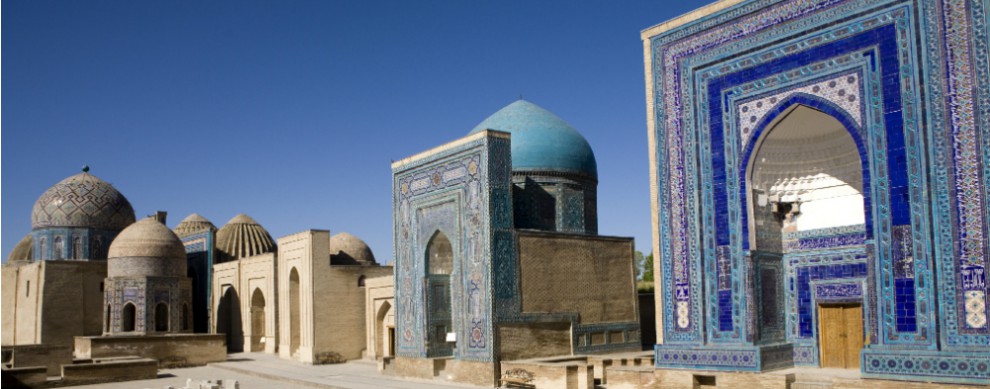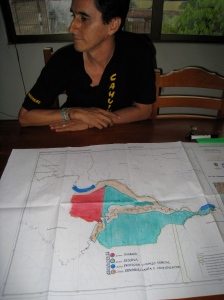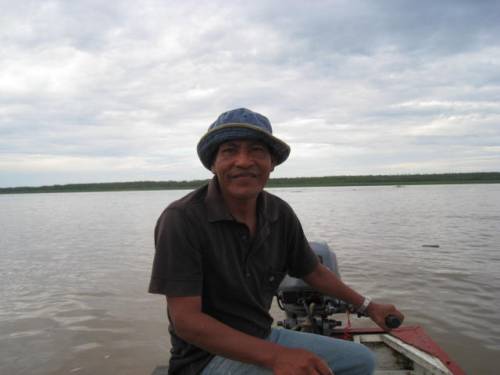We step down into what looks like a drainage ditch on to a long-tail boat. This is the Amazon? All of the boat people wear little-kid rain-boots, it is profoundly muddy, and the rubber boots keep you from slipping. If I had to decide which prop would be my single most important asset in the Amazon it would be a toss-up between a mosquito net, my sun hat, and these jungle boots.
We were told to wear sunscreen and big hats for our 3.5 hour trip up the Amazon to the Amacayacu National Park. The Amazon is less beautiful than I expected–swampy, brown, full of floating tree trunks– it looks like the Atari 2600 video game we grew up on—Pitfall.
The tree canopy is low and the earth is flat. Nothing like the rain forest on the Pacific coast in the Choco where the turtles lay eggs on the beach or the mountains of Santa Marta where the Arhuacos plant coffee–the Amazon is it’s own bird.
Our hosts are National Park Rangers: descendants of the invading Spaniards: Diego, perceived as a white man, Sara, an American park volunteer who complicates the perception of Americans as natural-resource-exploiters and thankfully, two Tycunas–Stella and Alberto–my newest Indigenous friends.
This morning, Heather and I woke beneath mosquito nets at 5:30 AM and spent two hours bird watching with Alberto. Like our Tycuna guide from last night, who took us by canoe up the river to see snakes dangling in the trees,
Alberto also has a fifth grade education. His father hunted tibur, but for the past 27-years Alberto has quit hunting, only fishes for food, and has reduced what he grows to what he needs to feed his family. His props this morning include: a giant bird book, binoculars that need replacing, and his ears. The man can hear, impersonate, and identify all 1800 bird species of this ecosystem.
Here in the Amazon, the white man, starting with Francisco De Orellana, has attacked the Tycunas since as early as 1541. “They showed up looking for gold,” Alberto explains. There are two million Tycunas spread between Peru, Brazil and Colombia, our fathers hid us along this uninhabitable river. The missionaries often took Tycuna children, made them learn Spanish, study in their schools and start wearing clothes.”
This morning, on Alberto’s boat, we observe a few of the Amazon’s 7500 species of butterfly, 1800 species of birds, and 3200 species of fish. This watershed is home to a staggering 10% of all species found on the planet. Deforestation destroys 137 planet and animal species every day—50,000 species are lost every year.
Making the sound of the black hawk-eagle that just flew overhead, Alberto explains, “The main difference between us and them is that the white man is here to destroy the earth and we are here to preserve it. Every plant we see is alive. If a plant can cure us from yellow fever, yes, we take it and let it cure us. In exchange we vow to care for it. The white man comes in and cuts them all down and sells them as pharmaceuticals.”
My guidebook explains that 25% of all modern medicine is sourced here. I am beginning to notice a few common refrains and I can’t disagree with them.
“There are differences between us and the Arhuacos,” he continues. “We think that life began with the Capinuri tree, the tree you climbed yesterday in the woods. When this tree fell in the forest, it didn’t die, and the woodpecker came and pecked inside its trunk, looking for the heart of the tree, eventually it hit blood, this is how the woodpeckers head turned red and what flowed out from the tree became The Amazon.” He interrupts his story to impersonate the colorful parrot perched on a nearby tree.
“I am writing a book of the Tycuna stories,” he says. I listen to Alberto, sitting on his boat wearing jeans, a man who has lost so much of his culture and traditional wisdom. “We all agree that earth is our mother, as long as we preserve her, she gives us all we need to eat and heal but if the white man keeps destroying her, soon she will die.”
Later in the day, Stella, our second Tycuna guide, walks us through the trees and explains that we should concentrate, that trees have spirits too, they give us the wisdom and we need to not break the rules of nature while here in the jungle. Having seen my first tarantula, I believe her and obey every word.
Diego, works in two other parks, parks full of indigenous that are not used to seeing the white man. They believe that the white man bring disease and destroys the earth, they are very reluctant to let any one in. He unfolds his map and tells us this story of The Lost People. There is one community, the Yuris, who haven’t had contact with an outsider in 40 years (Don’t worry Kari, I won’t try). “Our job is to protect their land and make sure no one goes in: no tourists, no researchers, no guerrillas, no miners,” he says. “Once, 40 years ago, two tourists took a short cut, ran into them, they were naked, took out a family to study at the missionary post. After two months, everyone realized that no one could communicate with them and they were let go. The shamans of the near by communities tell us there are at least 200 still alive.
“Why does this matter to me?” demands Careful Reader. Well, I believe the Indigenous. I have seen the white man destroy and I am certainly a part of the force destroying the earth. Each minute I spend out in wide-open space, listening to the cacophony of birds, I wonder why we allow a single acre of deforestation. We need more Tycuna children who can impersonate the sound of a Woodpecker and the Porcupine; more Stella’s and Alberto’s explaining that wisdom comes from the trees, and more Edwin’s who can turn a jungle vine into nearly anything.
Is a career change imminent? Maybe I should help Alberto write his book!
———————————————————-
Careful Reader reminded me of this debated text.
In 1854, the “Great White Chief” in Washington made an offer for a large area of Indian land and promised a `reservation’ for the Indian people.
Chief Seattle’s reply, reproduced here in full, has been described as the most beautiful and profound statement on the environment ever made.
How can you buy or sell the sky, the warmth of the land? The idea is strange to us. If we do not own the freshness of the air and sparkle of the water, how can you buy them?
Every part of this earth is sacred to my people.Every shining pine needle, every sandy shore, every mist in the dark woods, every clearing and humming insect is holy in the memory and experience of my people. The sap which courses through the trees carries the memories of the red man.
The white man’s dead forget the country of their birth when they go to walk among the stars. Our dead never forget this beautiful earth, for it is the mother of the red man.
We are part of the earth and it is part of us.
The perfumed flowers are our sisters; the deer, the horse, the great eagle, these are our brothers.
The rocky crests, the juices in the meadows, the body heat of the pony, and man–all belong to the same family.
So, when the Great Chief in Washington sends word that he wishes to buy land, he asks much of us. The Great Chief sends word he will reserve us a place so that we can live comfortably to ourselves.He will be our father and we will be his children. So we will consider your offer to buy our land.
But it will not be easy. For this land is sacred to us.
This shining water that moves in the streams and rivers is not just water but the blood of our ancestors.
If we sell you land, you must remember that it is sacred, and you must teach your children that it is sacred and that each ghostly reflection in the clear water of the lakes tells of events and memories in the life of my people.
The water’s murmur is the voice of my father’s father.
The rivers are our brothers, they quench our thirst. The rivers carry our canoes, and feed our children. If we sell you our land, you must remember, and teach your children, that the rivers are our brothers, and yours, and you must henceforth give the rivers the kindness you would give any brother.We know that the white man does not understand our ways. One portion of land is the same to him as the next, for he is a stranger who comes in the night and takes from the land whatever he needs.
The earth is not his brother, but his enemy, and when he has conquered it, he moves on.
He leaves his father’s graves behind, and he does not care.
He kidnaps the earth from his children, and he does not care.
His father’s grave, and his children’s birthright, are forgotten. He treats his mother, the earth, and his brother, the sky, as things to be bought, plundered, sold like sheep or bright beads.
His appetite will devour the earth and leave behind only a desert.
I do not know. Our ways are different from your ways.
The sight of your cities pains the eyes of the red man. But perhaps it is because the red man is a savage and does not understand.
There is no quiet place in the white man’s cities. No place to hear the unfurling of leaves in spring, or the rustle of an insect’s wings.
But perhaps it is because I am a savage and do not understand.
The clatter only seems to insult the ears. And what is there to life if a man cannot hear the lonely cry of the whippoorwill or the arguments of the frogs around a pond at night? I am a red man and do not understand.
The Indian prefers the soft sound of the wind darting over the face of a pond, and the smell of the wind itself, cleaned by a midday rain, or scented with the pinion pine.
The air is precious to the red man, for all things share the same breath–the beast, the tree, the man, they all share the same breath.The white man does not seem to notice the air he breathes.
Like a man dying for many days, he is numb to the stench.
But if we sell you our land, you must remember that the air is precious to us, that the air shares its spirit with all the life it supports. The wind that gave our grandfather his first breath also receives his last sigh.
And if we sell you our land, you must keep it apart and sacred, as a place where even the white man can go to taste the wind that is sweetened by the meadow’s flowers.
So we will consider your offer to buy our land. If we decide to accept, I will make one condition: The white man must treat the beasts of this land as his brothers.I am a savage and I do not understand any other way.
I’ve seen a thousand rotting buffaloes on the prairie, left by the white man who shot them from a passing train.
I am a savage and I do not understand how the smoking iron horse can be more important than the buffalo that we kill only to stay alive.
What is man without the beasts? If all the beasts were gone, man would die from a great loneliness of spirit.
For whatever happens to the beasts, soon happens to man. All things are connected.
You must teach your children that the ground beneath their feet is the ashes of your grandfathers. So that they will respect the land, tell your children that the earth is rich with the lives of our kin.Teach your children what we have taught our children, that the earth is our mother.
Whatever befalls the earth befalls the sons of the earth. If men spit upon the ground, they spit upon themselves.
This we know: The earth does not belong to man; man belongs to the earth. This we know.
All things are connected like the blood which unites one family. All things are connected.
Whatever befalls the earth befalls the sons of the earth.
Man did not weave the web of life: he is merely a strand in it.
Whatever he does to the web, he does to himself.
Even the white man, whose God walks and talks with him as friend to friend, cannot be exempt from the common destiny.
We may be brothers after all.
We shall see.
One thing we know, which the white man may one day discover, our God is the same God. You may think now that you own Him as you wish to own our land; but you cannot. He is the God of man, and His compassion is equal for the red man and the white.
This earth is precious to Him, and to harm the earth is to heap contempt on its Creator.
The whites too shall pass; perhaps sooner than all other tribes. Contaminate your bed, and you will one night suffocate in your own waste.
But in your perishing you will shine brightly, fired by the strength of God who brought you to this land and for some special purpose gave you dominion over this land and over the red man.
That destiny is a mystery to us, for we do not understand when the buffalo are all slaughtered, the wild horses are tamed, the secret corners of the forest heavy with scent of many men, and the view of the ripe hills blotted by talking wires.
- Where is the thicket? Gone.
- Where is the eagle? Gone.
- The end of living and the beginning of survival.











amazonas es igual muy arhuaco…que fotos!!!
I love exactly what My partner and i discover and so today i’m following a person. Anticipate considering your current web site continuously.
I must style our interest for the kindness presenting help for you to the individuals that ought to have guidance on this particular crucial make any difference.
Merely had to state I’m just pleased that i stumbled on the web site!